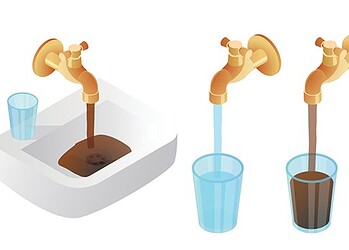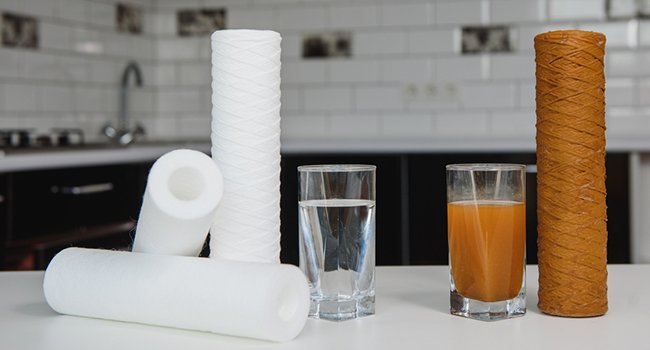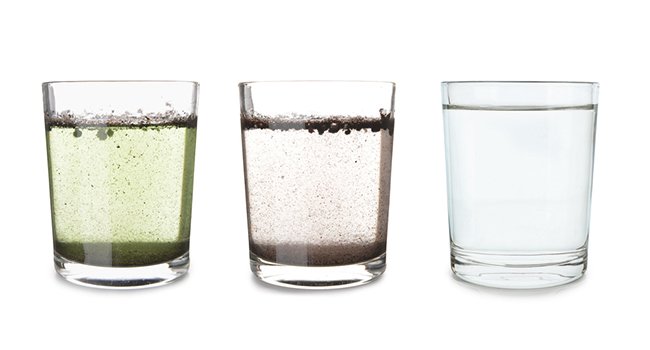How to Get Rid of Black Well Water
So you wake up in the middle of the night and go to the kitchen to run yourself a nice cold glass of water. While you are taking a refreshing drink, you realize that the water has a black tint to it, and upon further inspection, you find that there are little black particles floating in your glass.

This is enough to make many people panic and worry about what you just put into your body.
Getting straight to the point, it could be manganese, and while manganese is an essential nutrient for your body, you should be worried. Your body only requires minuscule amounts of the mineral, less than 10 mg per day.
In excess, it can affect the nervous system in such a way to give you the same symptoms of Parkinson's disease. Scary stuff.
Fortunately, it might not be manganese, it could be sand, or if you live in a previously volcanic area it could be the silt.
Luckily, there are several ways to test what the black stuff is and solutions for each potential issue.
How Manganese Affects Your Health?
Regardless of what it might be the fact that it could be manganese is cause for immediate concern.
Manganese is essential for the body to perform a wide variety of functions. It plays a role in hormone development, building bones and connective tissues such as tendons and ligaments, and plays a vital role in the nervous system as a whole.

By the nervous system as a whole, meaning the central nervous system and peripheral nervous system. Which includes your brain, spinal cords, and all or your nerves. You and your sense of 'I.'
Your body needs very little manganese per day to function properly. To put this into perspective a ½ teaspoon of salt is 1,300 milligrams. Medical and nutritional authorities believe that even 11 mg of manganese is unsafe.
What does the overconsumption of manganese do to you?
Too much manganese causes a myriad of health issues such as stunted growth, reproductive issues, memory loss, impaired motor skills. These can be permanent and irreversible, giving you symptoms that resemble the terminal disease Parkinsons.
This is because manganese directly competes with iron in your body.
So if your well has black sediment in the water. Stop using that water immediately.
The good news is that this is a problem that can be diagnosed and fixed.
Black Stuff in My Well Water: How to Clear up Muddy Water
When it comes to your well water and manganese you should know that manganese is a naturally occurring mineral and that having manganese in your water is not that uncommon.
There are several affordable options available to you when it comes to removing the mineral from the well water.
Treating Manganese With a Water Softener
A water softener is a filter used to treat what is called hard water. Hard water is water that contains a high amount of minerals such as calcium and manganese. Not only is hard water hard on the body, but it also leaves mineral deposits in plumbing, water heaters, wells, pressure tanks, and faucets.

Anywhere hard water goes it leaves a flaky crust of minerals behind and you can even check your faucets for this.
The reason these minerals stick to the surfaces it passes through and over is that calcium and manganese are positively charged molecules. Meaning that they will stick to molecules with a negative charge much like magnets.
Which is what a water softener takes advantage of. As water passes into a water softener it has to move through a negatively charged filter which collects the positively charged calcium and manganese molecules. The result is 'soft water' that is no longer a danger to your health or your plumbing.
Water softeners are relatively inexpensive to purchase and install and will last a long time with proper maintenance. Even an expensive water softener is going to be more affordable than the permanent health problems you can get from manganese toxicity!
Multi-stage Whole House Filters
Since we are on the topic of manganese in water and how to remove it, now is a good time to bring up the fact that just because you can see the black particles of manganese does not mean it is the only contaminant in your well water.
Water is a fantastic solvent, meaning that there is a myriad of different chemicals and minerals in your water that you can't see because it is in solution. Also, if you have other problems with your well water, such as sand, then you may want to consider getting a 3-stage water filter.
A 3-stage water filter will have a pre-filter, that removes those heavy particulates such as sand and rust, and soil from the water. After the sediment filter the water will pass through a carbon filter that filters what is known as VOC's, volatile organics compounds like chlorine, minerals like manganese, and calcium.
The third filter is often a redundant microfilter similar to the 2nd stage.
These multi-stage filters are more expensive but provide a higher-end result, and since water is the basis for life there isn't any reason why you shouldn't invest in your health.
Other Options
While pre-treatment filters will remove large particulates, and carbon and water softeners will remove minerals, VOCs, and organic contaminants. Oxidization filters (1)will also remove minerals from hard water.
These filters work by oxidizing the dissolved, or soluble, forms of iron, manganese, arsenic, and calcium to bind and trap them in a filter medium.
It performs the same function are the other filters mentioned in this article but does it differently.
While many 3-stage filter systems have disposable one-use filters that need to be replaced, oxidation filters and water softeners need to be flushed with salt brine to keep the filters functioning.
While this may seem like a pain at first keep in mind the purchasing expensive filters every few months will add up fast.
What Causes Muddy Well Water
As stated before, having black water may not just be from manganese or minerals in your well water. Those black particulates could be silt, or sand, which a prefilter will take care of, and it may just simply be a temporary issue.
There are a few reasons why you may be getting sediment or muddy well water:
1. The well casing could be cracked, which is not something anyone wants to hear. One way to tell is by running and outside spigot continuously until the water becomes clear if it does. If you turn the spigot off and let the pump cycle normally, and the water becomes dirty again, odds are it is a cracked well casing letting silt and soil into the well.
2. The well structure itself may be collapsing which is also a source of silt or muddy water.
3. If you have inherited a house or purchased one and find black particulates in the water, there is a potential it is the well casing. While casings last a long time, they too are prone to breaking down.
Sudden Sediment in Well Water
If you happen to suddenly have sediment in your well water is can be your well has suddenly collapsed. This can be because of a broken casing or if you live in a tectonically active area even a small earthquake can cause this.
It may also be that groundwater has managed to seep into your well. If your muddy well water problem happens after heavy rain and eventually runs clear then this is most likely the case.
If your casing is broken the only option is to replace it. If you are dealing with groundwater the fix is simple, you can pull the casing above the ground by a foot or two. This will prevent groundwater from running into your well.
Why Is My Well Water Dirty: Issues With a New Well
If you have dirty well water running out of a brand new well know that this is perfectly normal.
The boring process loosens and stirs up a lot of sediment and takes a few weeks to clear. In the meantime, you can use purchased water, bottle, or in jugs and continue to run your faucets regularly to help clear the well.

It should only take a week or two to clear. After that, I would suggest getting your water tested before use just to make sure you aren't dealing with any hidden surprises.
You Don't Have to Live With Dirty Water
Dirty well water is nothing to play around with, whether it is manganese, bacteria, silt, or just plain old mud. These are all serious and fixable problems.
Generally, a filter will be enough to fix any issues you may be having with hard water, manganese included. If your issues are more serious more often than not it is your well casing, which is an expensive fix.
In the very worst-case scenario, you may have to dig a whole new well.
Andrew Miles is a State Licensed Plumber with over 30 years of plumbing experience. Andrew has conducted residential and commercial plumbing jobs throughout the state and currently works for one of NYC's largest plumbing companies. When he's not working, Andrew enjoys spending time with his daughter.
How to Get Rid of Black Well Water
Source: https://waterfiltercast.com/black-sediment-in-well-water/